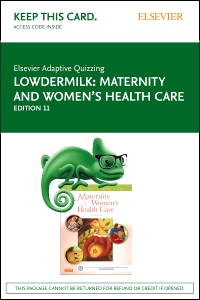
Elsevier Adaptive Quizzing for Lowdermilk Maternity and Women's Health Care (Access Card), 11th Edition
Elsevier Adaptive Quizzing - Access Card

Corresponding chapter-by-chapter to Maternity and Women's Health Care, 11th Edition, Elsevier Adaptive Quizzing integrates seamlessly into your course to help students of all skill levels focus their study time and effectively prepare for class, course exams, and the NCLEX exam. Elsevier Adaptive Quizzing is comprised of a bank of high-quality practice questions that allows students to advance at their own pace — based on their performance — through multiple mastery levels for each chapter. A comprehensive dashboard allows students to view their progress and stay motivated. The educator dashboard, grade book, and reporting capabilities enable faculty to monitor the activity of individual students, assess overall class performance, and identify areas of strength and weakness, ultimately helping to achieve improved learning outcomes.
-
- UNIQUE! Elsevier’s trusted, market-leading content serves as the foundation for all questions, which are written, reviewed, and leveled by experienced NCLEX educators, item writers, and authors. Each question will be accompanied by a specific chapter and page within your Elsevier text for convenient reference.
- UNIQUE! Unfolding questions become progressively more complex as students advance to higher levels, incorporating concepts such as delegation, multi-system diseases, or complicating conditions to help students strengthen their critical thinking and clinical reasoning skills.
- UNIQUE! Essential test-taking tips and strategies help students learn how to successfully dissect and tackle different question types and improve test-taking skills for both course exams and the NCLEX examination.
- Confidence level indicators allow students to indicate their confidence when submitting answers, providing valuable insight into areas where students might be overconfident and require further study.
- UNIQUE! Students can practice in Study Mode, which provides immediate feedback, or in Exam Mode where the quiz is timed and results are summarized at the end.
- UNIQUE! In addition to detailed rationales for each question, select questions include interactive, multimedia resources such as illustrations, animations, videos, audio clips, summary tables, and study tips to engage students with different learning styles and reinforce challenging material.
- The engaging, easy-to-use interface ensures that students and educators can navigate through the program with ease.
- Multiple mastery levels for each chapter allow students to progress from one level to the next based on individual performance.
- Alternate item format questions — including multiple-response, fill-in-the-blank, prioritizing, graphic options, chart/exhibit, video, audio, and hot spot — provide valuable NCLEX exam preparation.
- The comprehensive student dashboard allows each individual to view their personal learning progress with summaries of their strengths, weaknesses, mastery levels, and normative data.
- A robust educator dashboard and grade book highlight class scores and levels; usage and performance summaries; areas of strength and weakness tied to chapters for each student and class; and normative data that educators can use to modify lectures or class activities accordingly.
-
Unit One: Introduction to Maternity & Women’s Health Care
1. 21st Century Maternity and Women’s Health Nursing
2. Community Care: The Family and Culture
3. Nursing and Genomics
Unit Two: Women’s Health
4. Assessment and Health Promotion
5. Violence Against Women
6. Reproductive System Concerns
7. Sexually Transmitted and Other Infections
8. Contraception and Abortion
9. Infertility
10. Breast Disorders and Neoplasms
11. Structural Disorders and Neoplasms of the Reproductive System
Unit Three: Pregnancy
12. Conception and Fetal Development
13. Anatomy and Physiology of Pregnancy
14. Nursing Care of the Family During Pregnancy
15. Maternal and Fetal Nutrition
Unit Four: Childbirth
16. Labor and Birth Processes
17. Pain Management
18. Fetal Assessment During Labor
19. Nursing Care of the Family During Labor and Birth
Unit Five: Postpartum
20. Postpartum Physiologic Changes
21. Nursing Care of the Family During the Postpartum Period
22. Transition to Parenthood
Unit Six: Newborn
23. Physiologic and Behavioral Adaptations of the Newborn
24. Nursing Care of the Newborn and Family
25. Newborn Nutrition and Feeding
Unit Seven: Complications of Pregnancy
26. High Risk Pregnancy Assessment
27. Hypertensive Disorders
28. Hemorrhagic Disorders in Pregnancy
29. Endocrine and Metabolic Disorders
30. Medical-Surgical Disorders
31. Mental Health Disorders and Substance Abuse
32. Labor and Birth Complications
33. Postpartum Complications
34. Nursing Care of the High Risk Newborn and Family
Unit Eight: Newborn Complications
35. Acquired Problems of the Newborn
36. Hemolytic Disorders and Congenital Anomalies
37. Perinatal Loss and Grief
Glossary

 as described in our
as described in our 